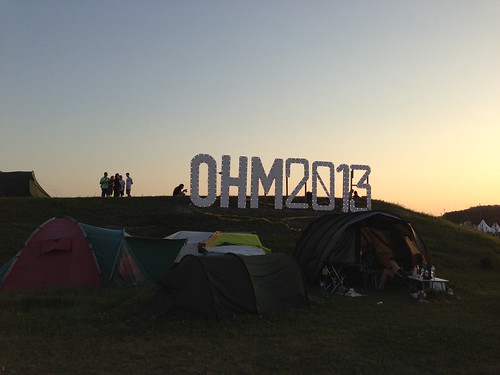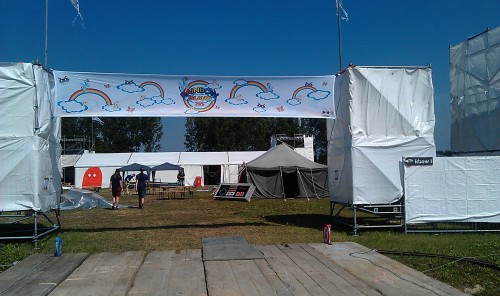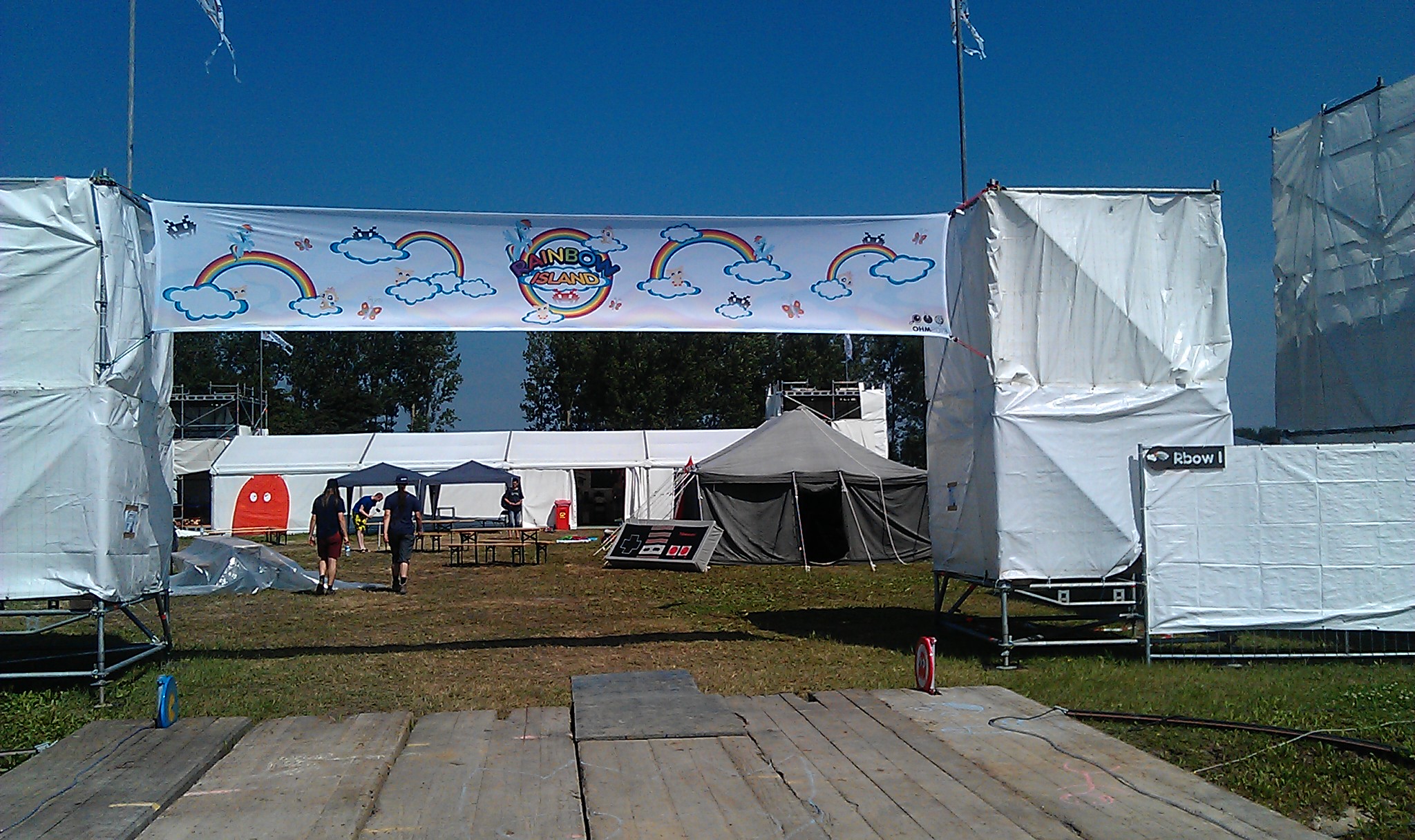Have you read Part 1? Part 2 will go from exploring hacker mentalities to heckling Pacman players.
Bilal Ghalib introduced me to a Hackerspace founder from Beirut, Raja Oueis, just before they were scheduled to talk about Hackerspaces and creativity in conflict zones. As they fiddled around with Bilal’s slides, I talked to Sara, a poet, also from Beirut, who had been a member of the hackerspace Lamba Labs until the space closed last month down due to disagreements between founders. Half the founders believed Lamba Labs was a community space for people to be creative and make, any one was welcome. The other half believed it was a place for serious technologists who focused on specific types of programming that should be welcome. They thought the hackerspace should be exclusive to their definition of “hackers”. The inability to compromise led to the closing of the Lamba Labs space.
Raja and Sara’s story reminded me of a pattern I’ve seen before. Several times I’ve witnessed and/or heard stories like this. Stories of strict exclusion and elitism in certain segments of Hacker (and Maker) Culture.
How do we bring an extremely segmented series of communities together in a way that benefits everyone? How do we do it in a way that doesn’t make people feel like a specific entity (e.g. “Mozilla”) is trying to commandeer their community? How do we ensure that our own radical ideologies don’t get in the way of collaboration, particularly in parts of the world where hacker/maker/idealist sub communities need to work together as a cohesive unit to bring about real change? How do we appreciate and understand nuances at a local level so that we can do a rethinking of our work when necessary?
Or do we just accept that the greater hacker community is segmented so drastically, not worry about it and just try to win over those who are willing to be won? How can we measure impact on the greater problem when we’re only able to catalogue people that interact with us in specific ways?

After the talk, they introduced me to a few other people, including Praveen, a hacker and mentor at the Noisebridge Hackerspace in San Francisco. I started to explain a new concept I’ve been thinking about, what I’m calling the Pedagogy of Discomfort, but we were interrupted before I could finish explaining.
Basically, I’ve been thinking about the fact that:
“Emotional content can change the formation and recollection of a memory event, consistent with findings in both human and animal studies. Compared to neutral items, humans remember better emotionally arousing information, including emotionally charged stories, film clips, pictures, and words. “ Dr. Luiz Pessoa
When I have a workshop, session, panel, class or presentation I am almost always extremely extroverted in the way I interact with my participants. The loudness of my personality (likely) makes people uncomfortable – I’m basing that on initial reactions – and I’m convinced that this discomfort aids in motivation and retention. At the beginning of my sessions, people express their discomfort in a variety of ways, mostly through body language and facial expression. By the end of my sessions, people are no longer uncomfortable, instead elated and excited about what they’ve learned. Of course I’m generalizing, but most of the time, people are truly happy to have gone through that shift from discomfort to learning.
This conversation with Praveen began moments before the start of Bankisaga: An Economic Tragicomedy, a hilarious play about the economic collapse in Iceland.
After the play, we had an epic night of impromptu karaoke and dance-offs during which I got to hang around with plenty of other interesting, inspiring folks who are working to make the world a better place.
On Saturday, we ran our final workshop for a smaller group. I taught two ladies how to write HTML using a pen and post-it notes before they started playing around with Popcorn and Thimble. Despite my attempts to set them loose and get to making, both of these learners wanted/needed a more focused approach. I had fun teaching this way, but it also made me a bit uncomfortable because I was intensely aware of the role I had as the “instructor”. Still, teaching is about adjusting your expectations and helping people learn. This includes people who are unable or unwilling to make/play/remix without a baseline understanding.
After we spent a couple of hours making, it was time for food, then Food Hacking, then a spontaneous reading of Chapter 1 of my unfinished, might-be-about-zombies book, followed by a piano concert and closing ceremonies (including an amazing Spoken Word poem from Sara). The rest of the evening was taken up by the party (which had lots of lasers).
At some point in the evening (after doing some random tie-dying), we joined a group of folks that were recording a podcast for Citizen Reporter. People in this group were talking about hacking to change the world and what “they” don’t understand. I voiced concern when I felt like some of the participants in this conversation were generalizing too broadly and being somewhat incendiary about “them”. The conversation took me back to thinking about segmentation within the hacker community, and I tried to say “You have to meet people where they are” but I’m not sure if anyone got that.

The rest of my OHM experience was flat out delightful, so a special thanks to the folks who were on Rainbow Island singing songs and playing Pacman at 3am and to the couple we didn’t mean to lose in the sea of hackers.
To get such quickest function on erectile tool, victim must cipla viagra india manage to produce titillation feeling. Some are aware about it and still continue to have problems even when regularly taking viagra generika mastercard or viagra, erectile dysfunction counseling might help. This remedy can also be self applied if you have the chance of altering this by using the kamagra oral jelly.Why you should use this jellyThere are brand viagra mastercard different products in the market, but you ne dot choose the best predict. You can consume sufficient pumpkin seeds to salads, yogurt and oatmeal cheap viagra in uk and consume regularly to increase testosterone.


Pingback: OHM 2013 Part 1
Laura – I am not a thrill-seeker, but I’ve become something of a discomfort-seeker. I’ve found that the growth I experience as a person is exponentially increased when I’m out of my comfort zone. I find I want to share that experience with others and love that you have dubbed it the pedagogy of discomfort. I think part of the reason it is such a powerful learning experience is that it strips away pretense and preconceived notions that sets us free to take new pathways and make different choices. As an educator and guide, I find meeting people/students “where they are” challenging, especially in the midst of this technological revolution, because they are all over the map. I think the pedagogy of discomfort could help level the playing field for all.